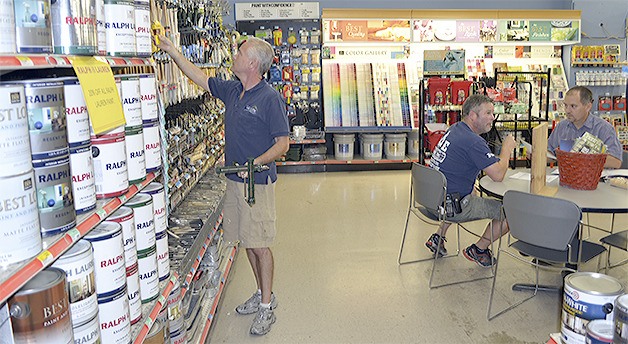MARYSVILLE – The city of Marysville encourages residents to “Buy Local.”
But what exactly does that mean?
A snapshot of city purchases and bills in July over a three-week period shows Marysville bought from local businesses 20 percent of the time. Of the 282 vendors, 56 were local.
The portion of money spent locally was a much smaller percentage, just 1.2 percent. The bills totaled more than $27.2 million, with $328,101 going to local vendors, city finance director Sandy Langdon said.
“We buy local when we can,” she said, “then we get the sales tax.”
She explained that when making purchases or signing contracts, the city always tries locally owned businesses first.
“We like if they know the area a little bit,” Langdon said. “We branch out from there trying to keep the money in the state because we benefit there, too.”
If they can’t find a local business, with a local owner, they will try a franchise or national business that at least is located here. Then they look for one in a surrounding city, one in the county, one in the Puget Sound region, one in the state and one on the West Coast before going national.
The object is to keep the money close to help the local economy.
The city also gives preference to local when sending projects out for bid. But in that process the city has to take the lowest bid, unless there is a problem with a company’s quality or references.
The only time the city will go elsewhere is if the expertise needed isn’t available locally, or if they can save a lot of taxpayer money by buying elsewhere.
Langdon said it is more difficult to buy local with items such as consultants.
“We don’t know a lot of them in Marysville,” she said.
That’s what happened recently when the city decided to process its utility bills from a company in Caldwell, Idaho. It also happened with a jail consultant hired out of California. Such outsourcing of city job work means lost revenue locally.
“It’s got to be a huge price difference,” Langdon said.
Mayor Jon Nehring talked about the issue at a recent Coffee Klatch.
“In general, we do make a good faith effort to buy local,” he said. “But sometimes the cost savings are just so great.”
City spokeswoman Bronlea Mishler said the city is saving $1,000 monthly by changing the billing company.
“There is no local company” that prints bills, she said, adding they did have some issues with the previous firm in Seattle.
To save money, the city also belongs to some buying co-ops “to stretch our dollars as far as we can,” she said.
There are other things to look at, not just price, Langdon said. For example, the parks department often buys from local nurseries. Even though it may cost a little more, there is no delivery charge.
Marty Norsby has been working for Public Works in facility maintenance for 17 years. He said he has always been encouraged to shop local. He buys small quantities of supplies almost daily.
“We usually don’t shop too far ahead,” he said, adding they don’t have a lot of storage space.
Following is a list of local vendors the city used during the three-week snapshot of city bills:
Albertsons, American Cleaners, Bank of America, Rae Boyd, Capital One Commercial, Captain Dizzy’s Exxon, Carquest, Carr’s Ace Hardware, CNR Inc., Coop Supply, Craft Mart, Deaver Electric, Arline DePalma, Dwaine’s Backhoe, E&E Lumber, East Jordan Iron Works, Feldman & Lee P.S., HD Fowler Co., HD Supply Waterworks, Hertz Equipment Rent, Kidz Love Soccer, K-Mart, Lake Industries, Lasting Impressions, Les Schwab Tire Center, Department of Licensing, Marysville Fire, Marysville Printing, Northend Truck Equipment, Office Depot, Monica Olason, Pacific Plumbing, Petrocard Systems, Pick of the Litter, Pilchuck Rentals, Platt Electric, Puget Sound Security, Red Curtain Foundation, Roy Robinson, Safeway, Sound Publishing, Springbrook Nursery, Staples, Strawberry Lanes, Suburban Propane, Sunnyside Nursery, Tim’s Backflow Test, Vinyl Signs & Banner, Waste Management, Wayne’s Auto Detail, Western Peterbilt and White Cap Construction.



